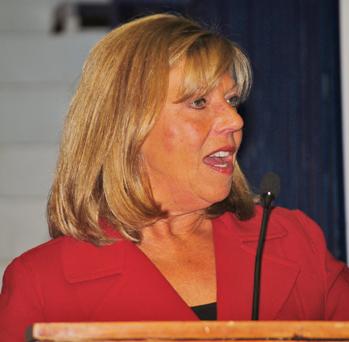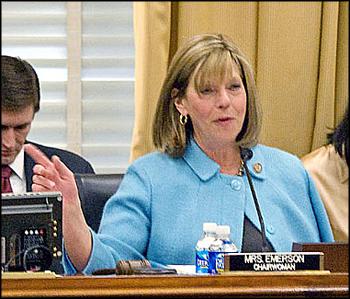
Jo Ann Emerson of Cape Girardeau represents the Eighth District of Missouri in the U.S. House of Representatives. Her Cape Girardeau Office may be reached at 573-335-0101.
Link of Interest

By Jo Ann Emerson
“Mr. Gorbachev, open this gate. Mr. Gorbachev, tear down this wall.”
These resolute words of President Ronald Reagan rang through West Berlin and echoed around the globe 25 years ago this week. To a world divided into free and not free, the President’s demand went straight to the heart of the defining conflict for an entire generation.
Only a few years later, the Cold War would end and a new era of communication, trade, opportunity and understanding would begin between East and West. The Berlin Wall would be destroyed both as a barrier and as a symbol of all the barriers between people and freedom.
The Berlin Wall served two purposes for the Cold War Communists. First, it kept people from leaving a life that had been planned out for them by the government, from cradle to grave. The Wall held captive a society in which freedom was suppressed, propaganda ruled the airwaves, bread lines were lengthy, and the patience of the government for criticism was short.
In its other purpose, the Berlin Wall kept out the machinery of democracy, examples of liberty in the rest of the world like free elections, free press, free speech, dissent and assembly, and free markets. In a world of sunlight, the Wall cast a long, dark shadow. The reasons to open the gate and to tear down the wall were many, but among the most vital was to unite an imprisoned people with the freedoms that allowed them to live out their human destiny.
President Reagan stood firm against the Soviet Union as more than a matter of military necessity. The resolve of the United States during this tense era was part self-preservation in the face of a vast nuclear arsenal, but also part instruction in the value of freedom and liberty. The message of our Founders was not to keep a candle of independence burning in a dark world, but to expand these ideals endowed upon all of us by our Creator.
History does not often provide us with inflection points like President Reagan’s speech at the Brandenburg Gate. Two outcomes were possible at the Berlin Wall: It would either fall to the power of human freedom or it would fall because communism was expanding its darkness into the light of the free world. Hundreds of thousands of American troops, our Allies in NATO, and countless people all over the world contributed to the ultimate goal of toppling the wall and spreading a message of freedom into the Eastern Bloc of Europe and beyond.
Today, we are still charged with being a beacon of freedom to the world. Things are rarely as black-and-white as they were when one part of the world was behind the wall, and another part of the world was outside of it. But our challenges remain to be as resolute as Reagan was, to demand that liberty go places where the thirst for freedom is great but the power of government is even stronger.
Military force cannot alone win freedom for oppressed people. Diplomacy won’t work in a vacuum, either. But the abiding spirit of the American people to be the source of power for our government – in elections, in a free press, as upstanding citizens of our communities, as free people – is the strength that gives courage to others in dark places. Twenty five years ago, Reagan gave hope to East Germans in one such dark place, and today they have democracy, elections and freedom of many kinds – most of all, freedom from fear.
Jo Ann Emerson of Cape Girardeau represents the Eighth District of Missouri in the U.S. House of Representatives. Her Cape Girardeau Office may be reached at 573-335-0101.
Link of Interest

New data from the Congressional Budget Office measures the share of federal debt per person in the U.S. in the recent past, the present and the future. It is stark and startling, but in a single generation the figure is set to triple.
In 2008, each American's share of the federal debt was $35,000. Today, only four years later, it is $50,000. In 2037, every American will be $147,000 in debt as a result of reckless spending, runaway programs and the inability of policymakers to come up with smart solutions today so we can avoid tough choices tomorrow.
And the numbers get bigger against the backdrop of American households, rather than individual citizens: in 2037, every family will bear $382,000 of federal debt -- just 25 years from today.
Imagine those figures next time you drive down the street in your neighborhood. Every house you count represents $95,000 in federal debt today. Every five driveways you pass is $500,000 today... and nearly $2 million in 25 years. In a Missouri city with a population of 1,000 people, the total represents $50 million of federal debt.
Stopping the accumulation of this massive debt depends on two things: the revenues the government takes in and the expenditures the government pays out. Both can be part of the solution.
On the revenue side, economic growth can make a substantial contribution to the federal balance sheet. We should invest in job-creating policies and refrain from regulations that slow growth and kill jobs. Tax fairness is important, too, to prevent fraud and to promote a level playing field for all Americans.
On the spending side, there is even more room for progress. By looking at the tax dollars we spent yesterday, today and tomorrow, we can reduce future federal deficits. I wrote legislation, for example, that trims $2 billion from the President's budget for the Treasury, the IRS, GSA and the 9th Circuit Court of Appeals in 2013. I'll fight to get that significant reduction enacted into law. If we win this argument in Congress and with the White House, we will have cut more than 12 percent in this area of federal spending since 2010.
And we have to assess the long-term health of federal programs for the possible reforms that not only save tax dollars, but keep important benefits alive and intact for the next generation. When the trustees of programs like Medicare and Social Security say they are going broke, we have to pay attention. One side wants to pay for these programs with higher taxes, and the other side wants to find reforms that extend them for future generations without changing terms or benefits for Americans drawing on them today.
Because if we anticipate our children's shares of the federal debt to triple in one generation -- and we do -- then we must be mindful of the legacy they can expect to leave their children, our grandchildren, in the generation after that.
Jo Ann Emerson of Cape Girardeau represents the Eighth District of Missouri in the U.S. House of Representatives. Her Cape Girardeau Office may be reached at 573-335-0101.
Link of Interest

By Jo Ann Emerson
Something amazing happened in Bourbon, Missouri last week. Two weeks prior to Memorial Day, a group of veterans and family members gathered at American Legion Post #81 in Bourbon to dedicate their new building. And on the program was a woman named Sheila Wood.
I started working with Sheila in September of last year to get her cousin, 2nd Lieutenant Dean Gilroy Murphy, the Purple Heart he earned when he was injured at Iwo Jima 67 years ago. His story is a definitive one of military service during World War II, only with a tragic end. From Camp Pendleton in California, Lieutenant Murphy shipped out on November 12, 1944. He died on April 7, 1945, during the turning-point battle of the Pacific Theater in World War II, twenty days before he would have turned 21 years old.
The family never claimed Lieutenant Murphy’s Purple Heart until cousin Sheila took on the project last September. We had the medal from the Department of Defense by December.
Last week, as we dedicated the American Legion Post in Bourbon, the Murphy family bestowed Lieutenant Murphy’s Purple Heart on the Post. They entrusted it to the American Legion with the understanding that the medal would be displayed so that Lieutenant Murphy would not be forgotten, as the award itself had been forgotten, for so long.
Ceremonies involving our veterans and their belated awards are always moving and always special, but this one was especially wonderful. So many American heroes are overlooked because of their modesty. So many tales of bravery and sacrifice are never passed on. So many honors and awards end up in drawers and lock boxes when they should be shared. Yet, these virtues cannot survive from one generation to the next unless we talk about them.
Blood, sweat and tears are contained in each Purple Heart awarded by our country. The medal represents an incredible cost in human terms to entire families. Without Americans who are willing to sacrifice for our nation and our freedoms, however, we would all be lost. So we must know these stories and we must remember them.
Since the Purple Heart was established in 1932, it has honored the bravery and the pain endured by exceptional men and women in the service of our country. For 80 years, these medals have been bestowed on patriots and heroes. Purple Hearts are not recommended; they are earned. It is the oldest military award still given to U.S. servicemembers.
And each Purple Heart has its own story. They are attached to veterans who put our country before themselves, and the circumstances of their sacrifices teach us a lot about the cost of the freedoms we treasure as Americans. Now, Lieutenant Murphy’s story can be told and remembered.
His is a Purple Heart for all of Missouri.
I’m so glad to tell his story, to honor his service and to thank his family for making such a selfless gift to their community.
Jo Ann Emerson of Cape Girardeau represents the Eighth District of Missouri in the U.S. House of Representatives. Her Cape Girardeau Office may be reached at 573-335-0101.
Link of Interest

By Jo Ann Emerson
The regulatory reach of the federal bureaucracy has reached disturbing levels. In Southern Missouri, we know the interest of federal agencies in regulating our lives includes dust on farms, milk storage on dairies, the freedom of our children to work in agriculture, access to roads and rivers, and the lead in fishing tackle, ammunition and the tire stem valves of ATV’s. The ozone produced by traffic on our interstates, this Administration says, could require our rural counties to shut down manufacturing businesses and eliminate local jobs.
More sweeping regulations are on the table, too, like the individual mandate to purchase health insurance, taxes on energy and manipulation of domestic resources, and water and air quality standards that bring every inch of American soil under the jurisdiction of the Environmental Protection Agency. A few of these examples have found their way into law over the objections of right-minded legislators, others are federal regulations, and some are proposals which have been temporarily shelved by the administration.
This last category is of the greatest concern. Congress can fight rules, regulations and overreach, but we cannot stop the Administration from thinking up new ways to undermine our economy and then putting them on ice.
And the outsized effect of these mostly-environmental regulations falls disproportionately on rural areas in the middle of the country. Manufacturing, agriculture and transportation are hit hardest by federal policies that pressure energy prices and restrict our ability to draw on the natural resources all around us.
The simple threat of these extreme regulations has a real effect on employers, communities and taxpayers, even if they are never implemented. But there is always the risk that they will be.
In the event that the president is not re-elected, a flurry of last-minute regulation could occur as this Administration goes out the door. Not only does this prospect cause great uncertainty for American businesses large and small, it also worries good government groups which do not believe an outgoing Administration should be allowed to effectively bind the hands of an incoming president. When that happens, the regulatory tangle can take years to untie. In the meanwhile, the economy and the country suffer.
It is one thing, of course, to urge restraint on this kind of aggressive regulation, but it is entirely another to prevent it in advance.
For starters, the Administration should be urged to exercise restraint, transparency and reason. I’m not sure that is a practical goal, given the fact that no previous White House has so dramatically expanded the regulatory reach of government into the private lives of American families and businesses.
Certainly, the pressure Congress and the public have applied to prevent many of these onerous regulations from moving forward should be kept up. We have to keep making the case for rural America and the families who make their living there.
But most importantly, this Congress and the next one should be prepared to quickly attack any of these efforts by this Administration to regulate on its way out the door. We will be.

